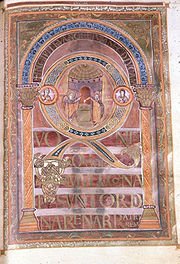
The Church of Christ, Scientist was founded in 1879 in Boston, Massachusetts, by Mary Baker Eddy, author of Science and Health with Key to the Scriptures, and founder of Christian Science. The church was founded "to commemorate the word and works of Christ Jesus" and "reinstate primitive Christianity and its lost element of healing". Sunday services are held throughout the year and weekly testimony meetings are held on Wednesday evenings, where following brief readings from the Bible and the Christian Science textbook, those in attendance are invited to give testimonies of healing brought about through Christian Science prayer.
Expository preaching, also known as expositional preaching, is a form of preaching that details the meaning of a particular text or passage of Scripture. It explains what the Bible means by what it says. Exegesis is technical and grammatical exposition, a careful drawing out of the exact meaning of a passage in its original context. While the term exposition could be used in connection with any verbal informative teaching on any subject, the term is also used in relation to Bible preaching and teaching. The practice originated from the Jewish tradition of the rabbi giving a "Dvar Torah", explaining a passage from the Torah, during the prayer services. Expository preaching differs from topical preaching in that the former concentrates on a specific text and discusses topics covered therein; whereas, the latter concentrates on a specific topic and references texts covering the topic.

The Book of Baruch is a deuterocanonical book of the Bible in some Christian traditions. In Judaism and Protestant Christianity, it is considered not to be part of the canon, with the Protestant Bibles categorizing it as part of the Biblical apocrypha. The book is named after Baruch ben Neriah, Jeremiah's well-known scribe, who is mentioned at Baruch 1:1, and has been presumed to be the author of the whole work. The book is a reflection of a late Jewish writer on the circumstances of Jewish exiles from Babylon, with meditations on the theology and history of Israel, discussions of wisdom, and a direct address to residents of Jerusalem and the Diaspora. Some scholars propose that it was written during or shortly after the period of the Maccabees.
Prayer has been an essential part of Christianity since its earliest days. Prayer is an integral element of the Christian faith and permeates all forms of Christian worship. Prayer in Christianity is the tradition of communicating with God, either in God's fullness or as one of the persons of the Trinity.

A lectionary is a book or listing that contains a collection of scripture readings appointed for Christian or Judaic worship on a given day or occasion. There are sub-types such as a "gospel lectionary" or evangeliary, and an epistolary with the readings from the New Testament Epistles.

In Christian communities, Bible study is the study of the Bible by people as a personal religious or spiritual practice. In many Christian traditions, Bible study, coupled with Christian prayer, is known as doing devotions or devotional acts. Many Christian churches schedule time to engage in Bible study collectively. The origin of Bible study groups has its origin in early Christianity, when Church Fathers such as Origen and Jerome taught the Bible extensively to disciple Christians. In Christianity, Bible study has the purpose of "be[ing] taught and nourished by the Word of God" and "being formed and animated by the inspirational power conveyed by Scripture".
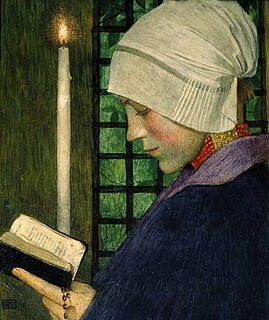
Christian meditation is a form of prayer in which a structured attempt is made to become aware of and reflect upon the revelations of God. The word meditation comes from the Latin word meditārī, which has a range of meanings including to reflect on, to study, and to practice. Christian meditation is the process of deliberately focusing on specific thoughts and reflecting on their meaning in the context of the love of God.

The Liturgy of the Hours or Divine Office or Opus Dei are the canonical hours, often also referred to as the breviary, of the Latin Church. The Liturgy of the Hours forms the official set of prayers "marking the hours of each day and sanctifying the day with prayer." The term "Liturgy of the Hours" has been retroactively applied to the practices of saying the canonical hours in both the Christian East and West –particularly within the Latin liturgical rites – prior to the Second Vatican Council, and is the official term for the canonical hours promulgated for usage by the Latin Church in 1971. Before 1971, the official form for the Latin Church was the Breviarium Romanum, first published in 1568 with major editions through 1962.
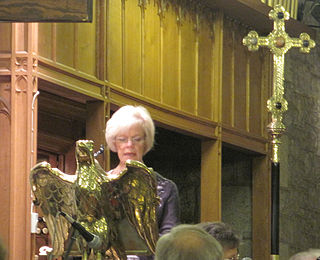
A lection, also called the lesson, is a reading from scripture in liturgy. In many Christian denominations, the readings of the day are appointed in the lectionary.
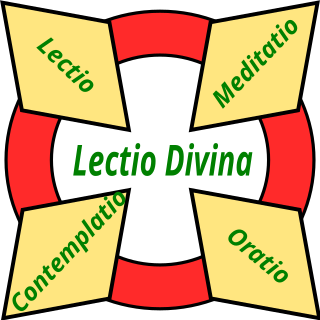
In Western Christianity, Lectio Divina is a traditional monastic practice of scriptural reading, meditation and prayer intended to promote communion with God and to increase the knowledge of God's word. In the view of one commentator, it does not treat scripture as texts to be studied, but as the living word.
A spiritual practice or spiritual discipline is the regular or full-time performance of actions and activities undertaken for the purpose of inducing spiritual experiences and cultivating spiritual development. A common metaphor used in the spiritual traditions of the world's great religions is that of walking a path. Therefore, a spiritual practice moves a person along a path towards a goal. The goal is variously referred to as salvation, liberation or union. A person who walks such a path is sometimes referred to as a wayfarer or a pilgrim.

The biblical apocrypha denotes the collection of apocryphal ancient books thought to have been written some time between 200 BC and AD 400. Some Christian churches include some or all of the same texts within the body of their version of the Old Testament, terming them deuterocanonical books. Traditional 80-book Protestant Bibles include fourteen books in an intertestamental section between the Old Testament and New Testament called the Apocrypha, deeming these useful for instruction, but non-canonical.

The Gospel in Christian liturgy refers to a reading from the Gospels used during various religious services, including Mass or Divine Liturgy (Eucharist). In many Christian churches, all present stand when a passage from one of the Gospels is read publicly, and sit when a passage from a different part of the Bible is read. The reading of the Gospels, often contained in a liturgical edition containing only the four Gospels, is traditionally done by a minister, priest or deacon, and in many traditions the Gospel Book is brought into the midst of the congregation to be read.

Anglican devotions are private prayers and practices used by Anglican Christians to promote spiritual growth and communion with God. Among members of the Anglican Communion, private devotional habits vary widely, depending on personal preference and on their affiliation with low-church or high-church parishes.

The Christian Science Quarterly is a publication of the Christian Science Publishing Society that sets out the Bible lessons for all students of Christian Science. Each lesson serves as the Sunday sermon in church and is studied for the week preceding the Sunday on which it is read as the sermon.
Daniel J. Harrington, S.J., was Professor of New Testament and Chair of the Biblical Studies Department at Boston College School of Theology and Ministry.

God Makes the Rivers to Flow is an anthology of spiritual texts for use in meditation, assembled by Eknath Easwaran. Condensed versions have been published under the titles Timeless Wisdom (book) and Sacred Literature of the World. First published as a book in the US in 1982, progressively enlarged or revised versions of God Makes the Rivers to Flow were also issued in the US in 1991, 2003, and 2009. English editions have been published in India, and a French edition has been published. The book has been reviewed in newspapers, magazines, professional journals, and websites, and utilized in research studies and education.
In Christianity, Lectio Sacra is a Latin term meaning sacred reading which refer to the reading of Scripture.
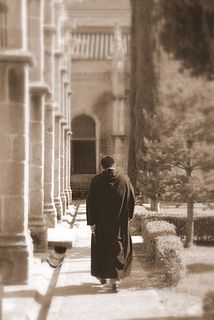
Prayer has been an essential part of Christianity since its earliest days. As the Middle Ages began, the monastic traditions of both Western and Eastern Christianity moved beyond vocal prayer to Christian meditation. These progressions resulted in two distinct and different meditative practices: Lectio Divina in the West and hesychasm in the East. Hesychasm involves the repetition of the Jesus Prayer, but Lectio Divina uses different Scripture passages at different times and although a passage may be repeated a few times, Lectio Divina is not repetitive in nature.

Aperuit illis is an apostolic letter, by Pope Francis, issued "motu proprio" on September 30, 2019, the Feast of Saint Jerome, instituting the annual observance of the 3rd Sunday of Ordinary Time as "Sunday of the Word of God", devoted to the celebration, study and dissemination of the Word of God. The first "Sunday of the Word of God" occurred on January 26, 2020. The Pope said that he wrote the Apostolic Letter in response to requests from around the world to celebrate the Sunday of the Word of God.
